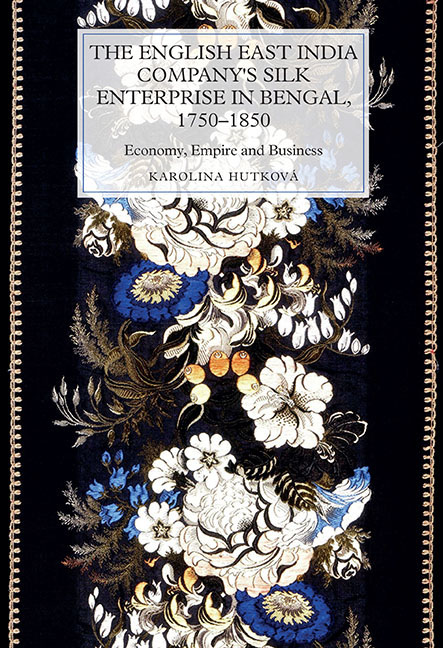Book contents
- Frontmatter
- Contents
- List of Illustrations
- Acknowledgements
- List of Abbreviations
- Measures and Currencies
- Introduction: Companies, Political Economy and the Great Divergenc
- Chapter 1 The Early Modern Silk Industry, Trade and Mercantilism
- Chapter 2 Empire, the English East India Company, and Bengal Raw Silk
- Chapter 3 Bengal, Piedmont and the English East India Company
- Chapter 4 The Bengal Silk Industry and the English East India Company
- Chapter 5 Filatures and Performance in the Bengal Silk Industry
- Chapter 6 The Bengal Silk Industry and British Laissez-Faire Policies
- Chapter 7 Bengal Raw Silk and British Demand in the Nineteenth Century
- Conclusion
- Appendix A Description of the Piedmontese Reeling Machine by Dionysius Lardner
- Appendix B Average Prices of Bengal Raw Silk on the British Market According to the Type of the Silk, 1796–1856
- Appendix C Return on Investment Analysis
- Appendix D Comparison of Manufacturing Costs at the EEIC's Experimental Filature and Common Filature in its Vicinity, 1832
- Appendix E Mechanisation of Silk Throwing and Weaving in England and Scotland, 1856
- Appendix F Types of Silkworm Reared in Bengal Silk Districts, 1818
- Appendix G Glossary
- Bibliography
- Index
- WORLDS OF THE EAST INDIA COMPANY
Introduction: Companies, Political Economy and the Great Divergenc
Published online by Cambridge University Press: 31 August 2019
- Frontmatter
- Contents
- List of Illustrations
- Acknowledgements
- List of Abbreviations
- Measures and Currencies
- Introduction: Companies, Political Economy and the Great Divergenc
- Chapter 1 The Early Modern Silk Industry, Trade and Mercantilism
- Chapter 2 Empire, the English East India Company, and Bengal Raw Silk
- Chapter 3 Bengal, Piedmont and the English East India Company
- Chapter 4 The Bengal Silk Industry and the English East India Company
- Chapter 5 Filatures and Performance in the Bengal Silk Industry
- Chapter 6 The Bengal Silk Industry and British Laissez-Faire Policies
- Chapter 7 Bengal Raw Silk and British Demand in the Nineteenth Century
- Conclusion
- Appendix A Description of the Piedmontese Reeling Machine by Dionysius Lardner
- Appendix B Average Prices of Bengal Raw Silk on the British Market According to the Type of the Silk, 1796–1856
- Appendix C Return on Investment Analysis
- Appendix D Comparison of Manufacturing Costs at the EEIC's Experimental Filature and Common Filature in its Vicinity, 1832
- Appendix E Mechanisation of Silk Throwing and Weaving in England and Scotland, 1856
- Appendix F Types of Silkworm Reared in Bengal Silk Districts, 1818
- Appendix G Glossary
- Bibliography
- Index
- WORLDS OF THE EAST INDIA COMPANY
Summary
This book focuses on the English East India Company's venture into silk manufacturing in Bengal and presents the Company as a manufacturer that invested over £1 million in developing raw silk production in India. The book thus complements two bodies of literature – the strand that portrays the English East India Company (EEIC) as a commercial monopolistic entity or power structure, and the one that explains the rise of European manufacturing in terms of import substitution. This book studies the activities of the EEIC in adapting Bengal raw silk production to meet the demands of British silk weavers. Central to this was the transfer of silk technologies from the West to the East – this was one of the first transfers from Europe to Asia rather than vice versa. The transfer occurred in a mercantilist framework, and the transferred technologies connected trade and manufacturing. The outcome of this venture was influenced by the business and management capacities of the EEIC and by British, and eventually imperial, policies. This book ultimately presents a case of manufacturing failure: it argues that rather than being a failure of colonial economies, it was a failure of British imperial policies. Such a failure produced negative consequences for the Indian economy and stifled Indian economic development. By studying a specific case of manufacturing failure this book also contributes to our understanding of the involution of the Indian economy.
Silk never achieved a high share of the global fibre market, and yet the economic, social and cultural role of silk in pre-industrial societies far outweighed its quantitative importance. Due to its high value and low volume, silk became one of the first globally traded commodities. Silk reeling – the process of silk thread production – and silk throwing – the process of making silk yarn from silk thread – were mechanised in Italy as early as the seventeenth and fourteenth century, respectively. As a labour-intensive industry, silk manufacturing had potential for employing the poor, produced goods of high value and generated state revenues through taxation. It thus attained the position of a strategic industry in many economies in Eurasia. The silk industry was also an important sector in Britain; although unable to produce raw silk domestically, Britain considered acquiring supplies of raw silk from its colonies and those territories under its influence. The most successful of such attempts was carried out by the EEIC in Bengal.
- Type
- Chapter
- Information
- The English East India Company's Silk Enterprise in Bengal, 1750–1850Economy, Empire and Business, pp. 1 - 16Publisher: Boydell & BrewerPrint publication year: 2019



